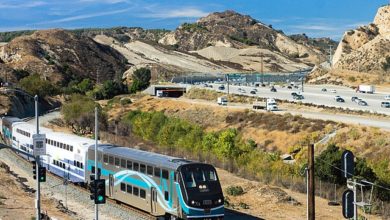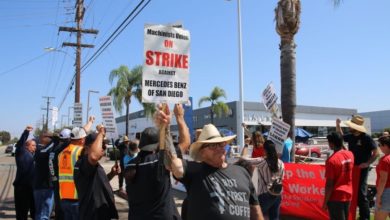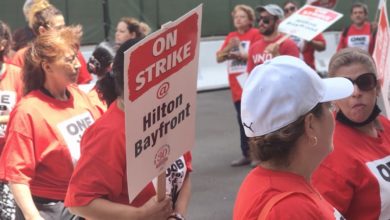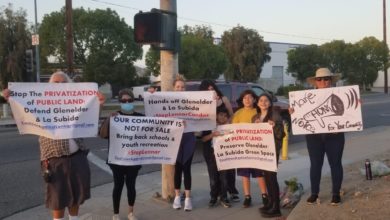Shouts of “Chicano power” echoed through San Diego on April 24 as dozens of people marched in the streets, calling for revolutionary change and an end to violence and exploitation.
Led by the Brown Berets de Aztlan, the “End Barrio Warfare” march was militant and disciplined. It included families with young children and supporters from the community as well as revolutionary organizers. The Party for Socialism and Liberation participated, alongside the San Diego Black Panther Party, People Over Profits, Unión Del Barrio, and Brown Berets from as far away as Houston, Texas.
Eddie Alvarez, Unit Commander of the Brown Berets de Aztlan, spoke to Liberation News about what precipitated the call-to-action to end barrio warfare. He explained: “It started when we lost a young individual named Brian [Romo]. Brian was a community member who used to hang out at the park.” The 15-year-old was fatally shot in October 2020 while walking from Chicano Park to a convenience store across the street.
Family members say that San Diego Police let him bleed out and prevented him from receiving life-saving medical attention by not allowing him to be taken to a hospital. “What happened to Brian was he was just in the wrong place at the wrong time. It’s an example of the same violence that we’ve been dealing with for decades,” explained Alvarez.
The April 24 event began in Golden Hill Park. Speakers talked about the effects of police terror, mass incarceration, racial profiling, gang enhancements, horizontal violence and other issues affecting the Chicano community. They also called for people in the neighborhood to recognize the systemic nature of these issues, as well as their own power to organize to change those conditions.
“We are so strong, just because of our numbers. But we’re not organized, we’re not educated enough,” said Alvarez passionately. “Now don’t get me wrong, just because you don’t have a high school diploma or a college degree, that doesn’t mean that you’re not educated.”
Alvarez urged people in the community to recognize their own revolutionary potential:
“I stand before you, speaking like a pro, but the reality is I don’t even have a high school diploma or a G.E.D. And I say that with pride, because I stand for what’s right. … When it comes to that feeling that you haven’t accomplished enough in life, when it comes to that feeling that you are not good enough, I understand that! That’s why I’m here. No one was there for me to speak about it. So when we’re out there marching, I want you to understand that is our message: becoming that healing source and that representation.”
Another speaker, Jose Cortes of the PSL said: “We’re very proud to stand in solidarity with people who are putting a revolutionary consciousness in our communities to address the symptoms of this corrupt system that has stolen our land, criminalized our people, and profits off of their suffering.”
Koran, a member of the San Diego chapter of the National Black Panther Party, spoke in solidarity. He said: “We are all revolutionaries, and it is up to us, it is up to everyone standing here to get the work done and to get the people organized so that we can make change where it needs to be made … and when we say all power to the people, we’re saying that the people have the power.”
After the march concluded in Chicano Park, Alvarez told Liberation News that he sees this ongoing violence as warfare. “I could name many other people that we’ve lost just in the last few months,” he continued. “It goes to show how fast it happens.”
The Brown Berets maintain a visible presence in Barrio Logan and aim to present an organized, revolutionary option to those disillusioned with the system and feeling stuck in what Alvarez called “survival mode.”
“The people want change, but they aren’t sure what that change is yet,” Alvarez said.
Alvarez went on to explain that they are trying to create a vehicle for social change that is flexible enough to adapt to changing conditions and to adjust tactics based on feedback from the people they are trying to serve.
“We are trying to create a space for people to voice their opinion, and make them understand that we will take on their demands. It’s important to make those contacts and learn from the people.”





